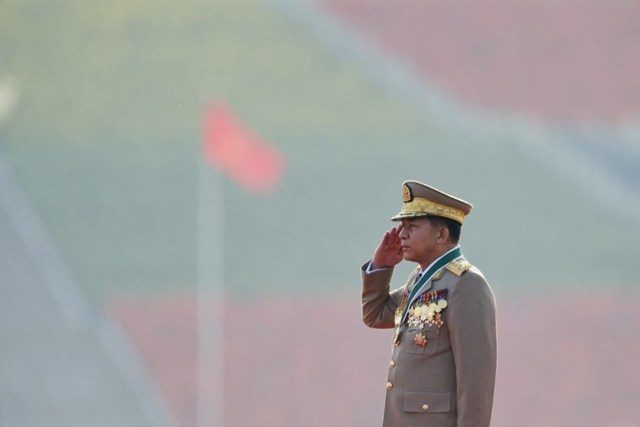SUMMARY
This is AI generated summarization, which may have errors. For context, always refer to the full article.

NAYPYIDAW, Myanmar – Myanmar’s powerful army chief vowed on Sunday, March 27, to keep the nation “on the path to democracy,” days before Aung San Suu Kyi’s civilian government takes office after decades of army rule.
Senior General Min Aung Hlaing made the remarks at an annual display of military might by Myanmar’s armed forces, a body that long crushed democratic aspirations with an iron fist but has since stewarded the country through a remarkable transition.
“I would solemnly impart the fact that the Tatmadaw (army) will cooperate to bring about the prosperity of the Union and its citizens,” he said during a speech to troops at the annual Armed Forces Day parade in the capital Naypyidaw.
“The two main obstacles to democratization are a failure to abide by the rule of law and regulations and the presence of armed insurgencies. These could lead to chaotic democracy,” he added.
“Only if these two obstacles are properly tackled and overcome will there be advancement on the path to democracy.”
Myanmar has undergone a stunning political transformation since 2011, blossoming from isolation under successive juntas to become an increasingly vibrant nation.
Its growing political openness was crowned by a historic November election that saw Suu Kyi’s National League for Democracy storm to victory.
After a lengthy transition her government will take over from the outgoing army-backed administration on Wednesday, ending more than five decades of direct and indirect military rule.
Suu Kyi, who is banned by a military-era constitution from becoming president, will serve as foreign minister but has vowed to rule through her proxy president Htin Kyaw.
Her ability to cooperate with and confront the still powerful military will be a crucial test of her government, which faces a range of challenges including poverty, corruption, years of chronic under-investment and insurgencies by ethnic minority rebels.
The military still holds strong political sway under a charter that reserves a quarter of parliament seats for unelected soldiers and grants the army chief direct control over 3 key ministries: home affairs, border affairs, and defense.
It also has significant financial clout, with two sprawling military-owned conglomerates owning vast chunks of the economy and decades of wealth accumulated by the military elite over the years.
Sunday’s parade was a vivid reminder of the military’s wealth with polished battle tanks, surface-to-air missiles, armoured vehicles and helicopters all on display.
During junta rule, spending on education and healthcare was a fraction of the military’s budget, a daunting legacy which now confronts the incoming civilian government.
Suu Kyi did not attend the parade. – Rappler.com
Add a comment
How does this make you feel?
There are no comments yet. Add your comment to start the conversation.